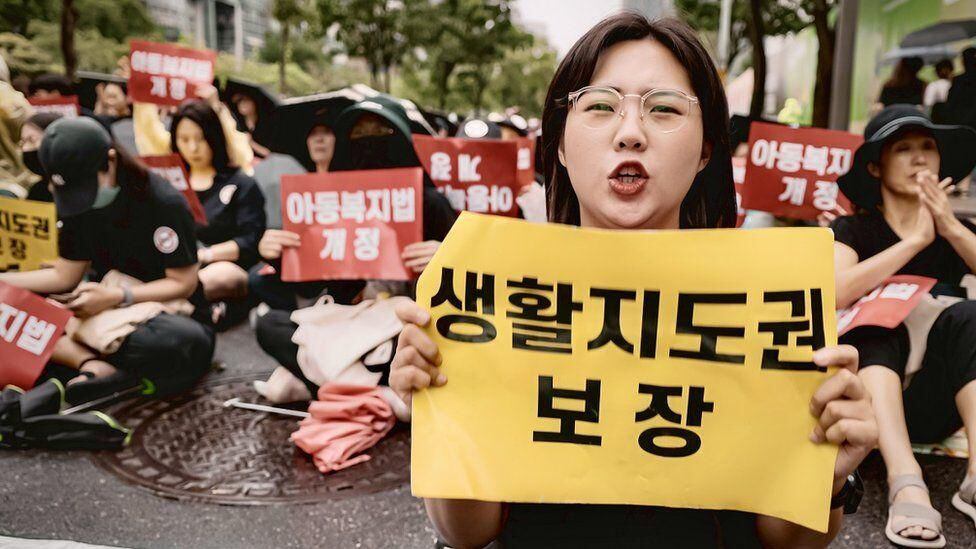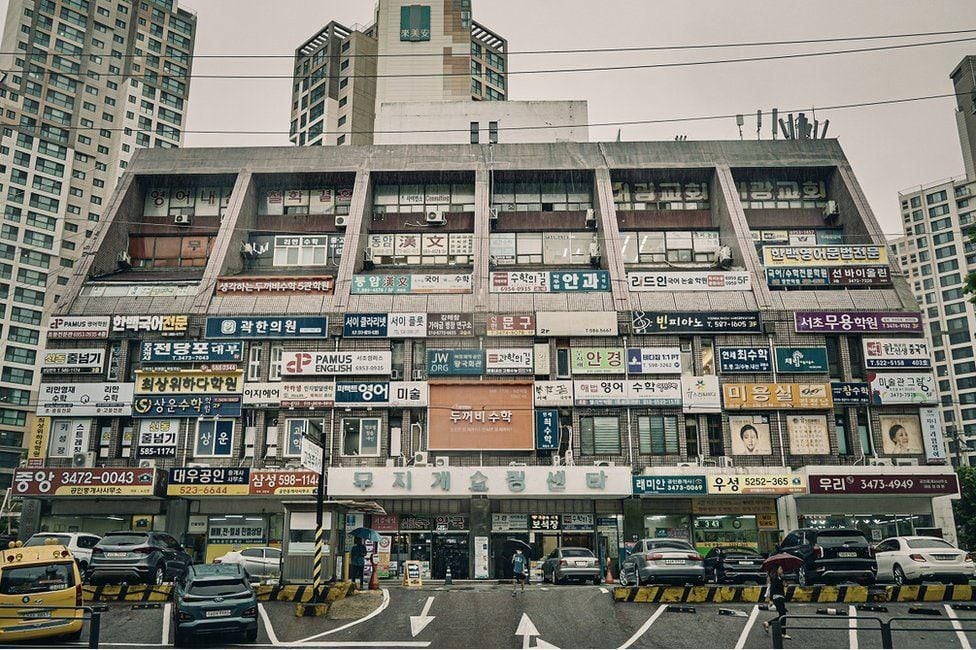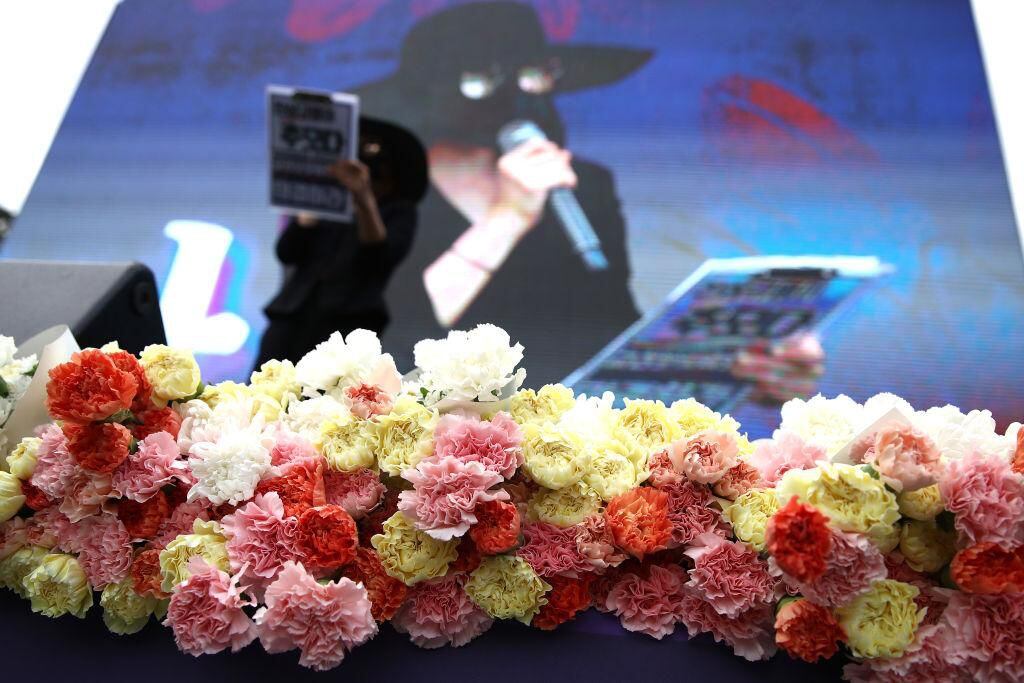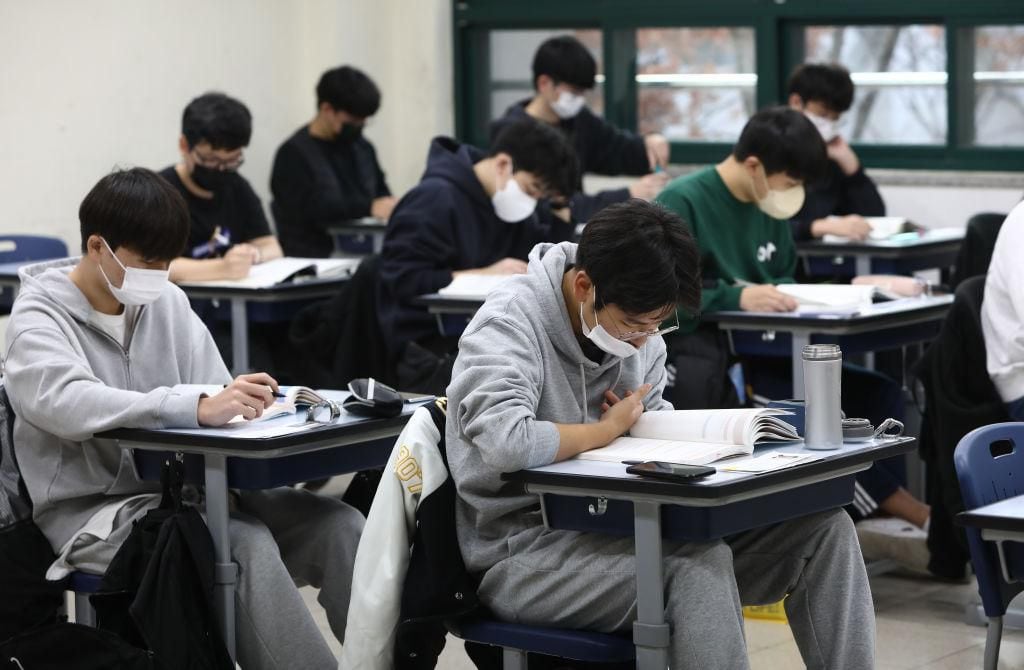On June 5, Lee Min-so* described in her diary the fear that gripped her body as she entered her classroom to teach: “I feel a very strong pressure on my chest. I’m drowning. I feel like I’m going to fall. I don’t even know where I am.”
On July 3, the elementary school teacher wrote that she had been so overwhelmed by the craziness of her job that she “He wanted to let go.”
LOOK: Bombing of La Moneda: the other air attacks that took place on September 11, 1973 in Santiago (and the girl hit by a projectile)
Two weeks later, her classmates found her dead in her classroom closet. She had taken her own life.
This tragedy has unleashed a wave of anger among primary school teachers across South Korea.
tens of thousands of them went on strike to demand greater protection at work. They say they are often harassed by pushy parents, who call them at all hours of the day and on weekends, complaining incessantly and unfairly.
Hands tied
Park Du-yong, Min-so’s cousin, struggles not to cry as he fixes up her small, empty apartment, where now only her goldfish lives.
Her bed is unmade and, next to her, there are a bunch of pictures of her first graders telling her how much they loved her. Underneath is a stack of library books on coping with depression.
Park says her cousin had been teaching for a little over a year, fulfilling her childhood dream of practicing the same profession as her mother. She adored children, she says.
So in the days after his cousin’s death, which the police were quick to attribute to a recent breakup, Park assumed the role of detective. He dug up hundreds of entries in his journalwork logs and text messages.
They revealed that in the months leading up to the suicide, Min-so had been bombarded by parental complaints. Recently, one of her students had struck another in the head with a pencil, and she had gotten into heated phone calls and messages with her parents.
Over the past six weeks, tens of thousands of teachers have demonstrated in Seoul, claiming that they are now so afraid of being called child abuserswho are unable to discipline their students or intervene when they attack each other.
They accuse parents of taking advantage of a child welfare law, passed in 2014, which says teachers accused of child abuse are automatically suspended.
Teachers can be charged with child abuse for holding down a violent child, while a mild scolding can be classified as emotional abuse. These accusations can lead to the immediate expulsion of a teacher from her job.
A teacher received a complaint after refusing to a father’s request to wake up his son with a phone call every morning. Another was reported for emotional abuse after removing reward stickers from a child who had cut his classmate with scissors.
Beyond the classroom
At one of the protests, 28-year-old teacher Kim Jin-seo declared that she had had suicidal thoughts and needed three months off work after two particularly aggressive complaints.

In one case, he had asked a troubled student to take five minutes to collect his thoughts in the bathroom, while in the other, he had reported a child to his parents for fighting. In both cases, the school forced her to apologize.
Kim says she got to a point where she didn’t feel like she could teach class feeling confident.
“Teachers feel very helpless. Those who have experienced it in the first person have changed radically, and those who have not, have seen how it happened to others, so in any case it is debilitating,” he admitted.
This culture of complaining in favor of their children contributes to the hypercompetitive society in South Korea, where almost everything depends on academic success.
Students compete fiercely to get the best grades from a very young age, in order to one day enter the best universities. Outside of school, parents send their children to expensive after-school schools known as hagwonswhich work from 5 in the morning to 10 at night.
Added to this is the pressure parents feel today. If before, Korean families had five or six children, now most only have onewhich means they only have one chance to succeed.
Professor Kim Bong-je, who trains future teachers at the Seoul National University of Education, says rising inequalities play a role as well.

Traditionally, Korea had a deep-rooted culture of respect for teachers, he explained, but due to the country’s rapid economic growth, many parents now have higher education.
“This means that teachers are often looked down upon,” he says. “They think they have paid for them with their taxes, and that gives them the feeling that they are entitled“.
Another teacher, Kwon, told us that in the 10 years he had been teaching he had taken two sick days to deal with depression and panic attacks, triggered by the stress caused by parents and students.
Until four years ago, a disruptive student could be sent out or to the back of the classroom, he said, but then parents started suing for child abuse.
Kwon recently transferred to a school in a poorer community, confirming that the behavior of parents from wealthy areas was much worse.
“His mentality is ‘only my son matters’and when you only think about sending your own child to a good university, you become very selfish,” he says. He has no doubt that this pressure trickles down to the children, affecting their behavior as well.
“They don’t know how to get rid of this pressure, so they act by hurting each other.”
difficult solution
Bullying and violence among students are known problems in South Korean schools.
Last year, the popular drama The Glory it revolved around a woman seeking revenge on her former stalkers. It was based on true events and featured some disturbing acts of violence..
As if the plot was not enough, the director of the series himself was accused of harassment and was forced to apologize.

In February, the government, under pressure to address the problem, announced that students’ bullying records would be included in their university applications.
Although it was hoped that students would be encouraged not to bully each other, this has further fueled parental anxietywho pressure teachers to erase their children’s wrongdoing from the records.
Shin Min-hyang, who heads the organization Solidarity for the Protection of Human Rights of Students and Parents, admitted that many of the behaviors pointed out last month were unacceptable, but argued that these cases were atypical.
“The vast majority of parents are well behaved, and we are concerned that the channels we use to communicate our concerns will now be cut off. Parents are being blamed, and that is not right,” he said.
But Shin admitted that he had also complained about teachers in the past and would like to have more influence over what his children are taught and how they are disciplined.
Another parent, who did not want to give his name, said he was concerned that the complaints had gotten out of hand. He showed us the content of a group chat, in which parents encouraged each other to harass a teacher for a decision he had made.
“If they block your number, call the phones of your family and friends,” said one of the members of the chat.
“If teachers don’t have the power to intervene with problematic students, then others will be negatively affected,” the anonymous parent told us.

In addition, there is a risk that students may be left with fewer teachers.
According to a 2023 survey, less than a quarter of teachers (24%) were satisfied with their work, up from 68% in 2006, when the survey began. A large majority stated that they had thought about leaving the profession in the last year.
The Government has recognized that there is a serious problem and that the classrooms are “broken”. To deal with this, it has published new guidelines for teachers, which establish that they will be able to take troublesome students out of class and hold them if necessary.
It also says that parents should agree in advance with teachers on the date and time of meetings, and that teachers can refuse to meet outside of working hours.
South Korean Education Minister Lee Ju-ho said he hoped these measures would “bring schools back to what they should be.”
But there are not a few who maintain that it is not only the classrooms that do not work, but that it is necessary to reform the entire South Korean education systemalong with the narrow definition of success that prevails in the country.
And they point out that everyone would benefit from a society in which notes do not make or break life.
*We have changed the name of the deceased at the request of her family.
Additional reporting by Hosu Lee and Lee Hyun Choi
Source: Elcomercio
I am Jack Morton and I work in 24 News Recorder. I mostly cover world news and I have also authored 24 news recorder. I find this work highly interesting and it allows me to keep up with current events happening around the world.

:quality(75)/cloudfront-us-east-1.images.arcpublishing.com/elcomercio/LEB2WUHHL5AZ5BBCJN7MYURN6Q.jpg)

:quality(75)/cloudfront-us-east-1.images.arcpublishing.com/elcomercio/HM7Z3R5SAFBRLDVNLEUTAAKAYY.jpg)

:quality(75)/cloudfront-us-east-1.images.arcpublishing.com/elcomercio/APRA4FMOPBAG7HQEHXTM7ZI2HA.jpg)

